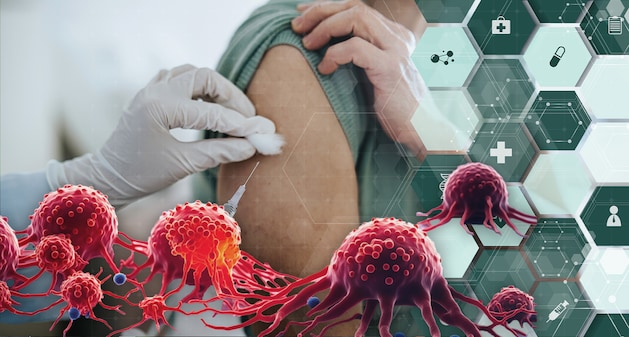Cancer medicine will experience a change in the coming years: away from standard therapies towards completely individual medications, tailored to each individual patient. This is made possible by a technology that we have all known since Corona.
Every year almost half a million people in Germany suffer from cancer. More than 220,000 patients still die from it every year. But mortality has been falling for decades. For fewer and fewer people, a cancer diagnosis is also a death sentence. This is thanks to great advances in medicine, which were driven forward, among other things, by the pandemic.
FOCUS online spoke about this with Dirk Jäger, director of the Department of Medical Oncology at the National Center for Tumor Diseases in Heidelberg. He explains why in the future every cancer patient could receive a medication that is specially made for them and therefore particularly effective, and what that has to do with Corona.
First of all, for comparison: “In the past, many patients were included in a study. If it was then determined that therapy A worked better than therapy B, all patients were treated with therapy A,” explains Jäger. Today we know that “no two patients are completely comparable molecularly.” Therapy must therefore be much more individualized – tailored to the specific requirements of the individual patient and their tumor.
Once produced, such a drug can then be administered in the form of a vaccination. Here, cancer medicine benefits from a process that was perfected in the fight against Corona: mRNA technology. It is already being used in studies on cancer patients.
The following graphic shows the process of cancer treatment with an mRNA vaccine:
(1) The vaccine penetrates the cell.
(2) It contains the blueprint for a non-infectious pathogen. This is transported to a so-called antigen-presenting cell, APZ for short. These are cells that ensure that our immune system kicks in and fights a pathogen in the event of illness. This works automatically for most diseases, but not for cancer.
(3-4) With the help of the vaccine, so-called immunogens are now formed.
(5-7) These in turn are able to trigger a reaction from the immune system.
What was already evident during the pandemic: mRNA vaccines are quicker and easier to produce than conventional vaccines that contain weakened pathogens. The procedure is therefore particularly suitable for cancer medicine. As part of a current study on patients with pancreatic cancer, Biontech, one of the manufacturers of the corona vaccination, produced the cancer vaccines.
After vaccination and subsequent surgery, the disease progressed significantly better, reports Jäger. This is despite the fact that pancreatic cancer has one of the lowest survival rates of all types of cancer.
The progress in cancer medicine is particularly positive in the treatment of black skin cancer, even if metastases have already formed, i.e. the tumor cells have spread throughout the body. “Now probably half of the patients have a chance of long-term survival despite metastasis. “It was completely different ten years ago, when these patients had a prognosis of less than a year.”
“There are tumor entities where we are still seeing very hesitant progress,” admits Jäger. For example in the treatment of brain tumors. “But we now have the first early, very exciting results from cell therapy in this area too.”
About the process of cell therapy: “You take lymphocytes, i.e. white blood cells, from the patient and manipulate them outside the body by introducing genetic information into the cell.” Back in the body, this genetic manipulation leads to the white blood cells recognizing cancer cells and can attack.
A treatment that is tailored exclusively to a single patient – highly effective, but complex and expensive? Not necessarily, says Dirk Jäger. If this eliminates the need for long-term therapy, the individual procedure could ultimately be more time-saving and therefore cheaper than current treatment methods.
In the best case scenario, the injection enables the immune system to permanently fight the cancer cells. “We administer a living therapy that lives on in the patient and continues to be shared,” says Jäger.
What do people in Germany get sick with? In a major focus area, FOCUS provides online information about the four major widespread diseases
We shed light on the medical background surrounding causes, symptoms, risk factors and treatment options. At the same time, we show you what you can do for each illness to minimize the risk.
In case histories, one affected person also reports on their life with cancer, heart disease, dementia or depression – moving, sometimes sad, but always encouraging.
However, it will still be years before the use of a highly individualized medication becomes part of everyday clinical practice. Further studies in patients are needed. Among other things, you have to clarify which types of cancer can be combated particularly well in this way. And in which stage of the disease the treatment works best. In patients whose tumors have been surgically removed and who only have a few cancer cells left in their bodies, the injection could position the immune system much better against the tumor remnants than in patients with many metastases.
There are also strategic and economic considerations: “We can no longer simply order such a drug from the pharmacy, but have to produce it individually for each patient,” says Jäger. It is still unclear how clinics will work with pharmaceutical production facilities or academic centers in the future to develop such substances.
Nevertheless, Jäger is certain: Over the next five years, doctors will treat more and more cancer patients with individual therapy, possibly in combination with other therapies. “To do this, we will have to find out more molecular, immunological data from each individual patient. That means we have to do deeper diagnostics. But this will make our therapies more precise and effective.”















